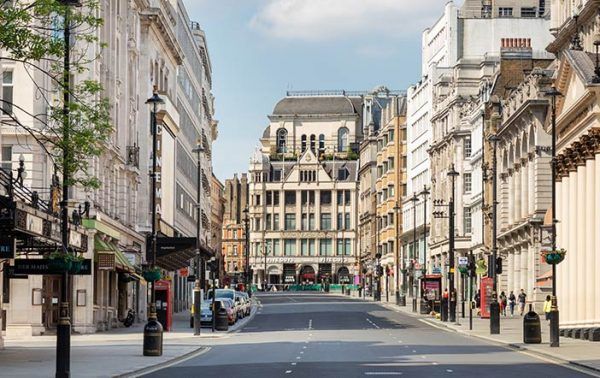
Government spring budget announcement 2021/22
Today, 3 March 2021, the Chancellor of the Exchequer presented the Treasury’s Spring Budget 2021/22. Speaking before the House of Commons, Rishi Sunak offered the full “fiscal firepower” of the Government to mitigate against the economic fallout of the pandemic with an additional £65bn in COVID financial support.
Key announcements for Heart of London members:
CORPORATION TAX
In 2023 corporation tax will rise to 25%
In line with the increase in the main rate, the Diverted Profits Tax rate will rise to 31% from April 2023 so that it remains an effective deterrent against diverting profits out of the UK
BUSINESS RATES
The 100% business rates holiday in England will continue from April until June.
This will be followed by 66% business rates relief for the period from 1 July 2021 to 31 March 2022, capped at £2 million per business for properties that were required to be closed on 5 January 2021, or £105,000 per business for other eligible properties.
The government will legislate to ensure that the business rates relief repayments that have been made by certain businesses are deductible for corporation tax and income tax purposes.
VAT
Hospitality and tourism sectors 5% rate of VAT to be extended for six months to 30th September, with an interim rate of 12.5% for an additional six months before returning to 20%.
The VAT registration and deregistration thresholds will not change for a further period of two years from 1 April 2022.
VAT Deferral New Payment Scheme – Any business that took advantage of the original VAT deferral on VAT returns from 20 March through to the end of June 2020 can now opt to use the VAT Deferral New Payment Scheme to pay that deferred VAT in up to eleven equal payments from March 2021, rather than one larger payment due by 31 March 2021, as originally announced.
FURLOUGH
Extended until the end of September. Between now and June 30, the government will continue to pay 80 percent of wages for furloughed workers up to £2,500 a month. From July 1, the state support will taper off, with the government then paying 70 percent of wages up to a cap of £2,187.50, and employers covering the rest. From August 1, the government will pay 60 percent of wages up to £1,875, with employers having to pick up the remaining 20 percent.
CULTURE
Museums, galleries and live music venues will receive a further £400m of financial support to help them re-open following easing of restrictions. This will see the COVID Culture Recovery Fund increase from £1.57bn. Museums are specifically set to receive a further £90m and local cultural projects £18.8m. The Treasury states that this will support 75,000 jobs.
A fuller account of Budget measures follows below.
London streets
The Budget is set out in three stages:
To support people and businesses during the immediate crisis.
To develop a comprehensive recovery plan.
To begin work on building the UK’s future economy.
THE CHANCELLOR HAS ANNOUNCED A RAFT OF NEW SUPPORT MEASURES THAT WILL BE BROUGHT IN TO ENCOURAGE ECONOMIC GROWTH, PRODUCTIVITY AND EMPLOYMENT:
Launch of a new ‘Recovery Loan Scheme’ for businesses of any size, from £25,000 to £10m through to the end of this year with a Government guarantee of 80%.
Hospitality and tourism sectors 5% rate of VAT to be extended for six months to 30th September, with an interim rate of 12.5% for an additional six months before returning to 20%.
VAT Deferral New Payment Scheme – Any business that took advantage of the original VAT deferral on VAT returns from 20 March through to the end of June 2020 can now opt to use the VAT Deferral New Payment Scheme to pay that deferred VAT in up to eleven equal payments from March 2021, rather than one larger payment due by 31 March 2021, as originally announced.
VAT reduction for the UK’s tourism and hospitality sector – The government will extend the temporary reduced rate of 5% VAT for goods and services supplied by the tourism and hospitality sector until 30 September 2021 to help businesses manage the transition back to the standard
£5bn allocated to restart grants for 700,000 shops, restaurants, hotels, hair salons, gyms and other businesses in England. Distributed directly to firms by local authorities from April.
The Self-Employed Income Scheme will include a 4th grant covering financial support between February to April, and a 5th grant from May to support the self-employed. This funding will be 80% of trading profits.
Continuation of the 100% business rates holiday through to the end of June. For the remaining nine months of the year, business rates will still be discounted by two thirds, up to a value of £2m for closed businesses.
Doubling of incentive payment to £3000 for every new apprentice hire, £126m to triple the number of traineeships
National Living Wage increased to £8.91 from April. This equates to an annual pay rise of almost £350 per annum.
A further £1.6bn for the UK’s vaccine rollout.
Stamp duty holiday has been extended until 30th June for homes worth up to £500,000. Once it ends the nil-rate band will remain at £250,000 until the end of September
A mortgage guarantee scheme for first time buyers to purchase properties worth up to £600,000 with deposit of 5%. The Government will underwrite the other 95%.
The £20-a-week temporary increase in Universal Credit has been extended for a further six months.
An extra £300m will be added to the government’s £1.57bn Culture Recovery Fund. Museums and cultural bodies in England will also receive £90m, totalling £408m financial support for cultural institutions in England.
A £300m package for sports has been confirmed with much of it targeted at cricket.
THE GOVERNMENT’S RESPONSE TO THE COVID-19 PANDEMIC HAS BEEN COSTED AT £407BN WITH £355BN BORROWED (17% OF NATIONAL INCOME) AND A FURTHER £234 BILLION TO BE BORROWED IN 2022. AS A CONSEQUENCE, THE CHANCELLOR HAS SET OUT SEVERAL TAX MEASURES:
Corporation tax will be increased from 19% to 25% in 2023.
On income tax, the threshold for paying the basic rate will rise to £12,570 next year. For higher-rate payers, the threshold will be £50,270. Both rates will stay the same until April 2026.
The VAT registration threshold will remain at £85,000 until 2024.
There will no increase on national insurance, VAT or income tax rates. Thresholds will be frozen. Personal allowance and higher rate on income tax both increase in 2022 but then stay in place until 2026.
In addition, the Budget includes a freeze on inheritance tax threshold, pensions lifetime allowance and capital gains tax.
Establishment of a ‘Super-Deduction’: Companies that invest can now reduce their tax bill by 130% of the cost. The Chancellor states that this will boost business investment by 10%.
BEYOND THOSE TAX AND COVID RECOVERY MEASURES, THE CHANCELLOR ANNOUNCED THAT:
The limit for a single contactless payment will rise from £45 to £100.
Help to Growth: £520m has been allocated to help businesses to develop digital skills with free expert training and a 50% discount on new productivity-enhancing software (up to £5000 each).
Extra £19 million to support victims of domestic abuse.
£10 million for veterans with mental health needs.
Lifetime commitment of funding for Thalidomide victims.
All alcohol duties to be frozen for the second consecutive year.
Fuel duty has also been cancelled again.
New National Infrastructure Bank, which is to be located Leeds and will begin with £12bn worth of capital.
Launch of world’s first sovereign green savings bond for retail investors.
A new unsponsored points-based visa to attract international talent in science, research and technology. In addition, a new visa processes for scale-ups and entrepreneurs will be formed.
A new ‘Future Fund: Breakthrough’. Businesses with £20m of R&D may be eligible for government funding.
Two new consultations on R&D tax relief and incentives.
Establishment of new free ports throughout the United Kingdom. They include: East Midlands Airport, Felixstowe and Harwich, Humber, Liverpool City Region, Plymouth, Solent, Thames & Teesside.
Applications have now been opened for “levelling up funds”.




